

I have an AWS Redshift Serverless database that I am querying through the redshiftdataapiservice of the AWS Go SDK. The query and all that works, but the records are returned in a format that is difficult to use/understand.
My code is like this:
import (
"fmt"
"log"
"time"
"os"
"context"
"github.com/aws/aws-sdk-go-v2/aws"
"github.com/aws/aws-sdk-go-v2/config"
"github.com/aws/aws-sdk-go-v2/service/redshiftdata"
"github.com/aws/aws-sdk-go-v2/service/redshiftdata/types"
)
// Execute a Redshift query and return a result statement output
func executeRedshiftQuery(sql string) (*redshiftdata.GetStatementResultOutput, error) {
// Load the Shared AWS Configuration (~/.aws/config)
cfg, err := config.LoadDefaultConfig(context.TODO(), config.WithRegion(os.Getenv("AWS_REGION")))
if err != nil {
return nil, err
}
// Create a service client
redshiftclient := redshiftdata.NewFromConfig(cfg)
execStmt, err := redshiftclient.ExecuteStatement(context.TODO(), &redshiftdata.ExecuteStatementInput{
WorkgroupName: aws.String(os.Getenv("WG_NAME")),
Database: aws.String(os.Getenv("DB_NAME")),
Sql: aws.String(sql),
})
if err != nil {
return nil, err
}
// wait for query to finish
for {
descStmt, err := redshiftclient.DescribeStatement(context.TODO(), &redshiftdata.DescribeStatementInput{
Id: execStmt.Id,
})
if err != nil {
return nil, err
}
// return an error if the query failed or aborted
if descStmt.Status == types.StatusStringFailed || descStmt.Status == types.StatusStringAborted {
err := errors.New("the Redshift query failed or was aborted")
return nil, err
} else if descStmt.Status != types.StatusStringFinished {
time.Sleep(1 * time.Second)
continue
}
break
}
// get the results
resultStmt, err := redshiftclient.GetStatementResult(context.TODO(), &redshiftdata.GetStatementResultInput{
Id: execStmt.Id,
})
if err != nil {
return nil, err
}
return resultStmt, nil
}I find that 2D arrays of *Fields are difficult to work with. How do I (preferably simply) map this to a usable JSON, or rather an array of type structs? Or is there a way to request JSON from Redshift? If possible, I'd like to keep all of this entirely within my Golang application.
I didn't find an official way, but the method below works by creating a mapping fragment of column names to column values and then unmarshalling from there .
// Extracts the column name from column metadata for a given column index
func getColumnName(metadata []types.ColumnMetadata, index int) string {
if index < len(metadata) {
// We assume the metadata is in the same order as the columns in the record.
// If the column name is not set or empty, we can fallback to a default naming convention.
if metadata[index].Name != nil {
return *metadata[index].Name
}
return fmt.Sprintf("column_%d", index)
}
// Fallback if the index is out of range of the metadata slice.
return fmt.Sprintf("unknown_column_%d", index)
}
// Converts query results to JSON bytes for easy unmarshaling to structs
func queryResultsToJSON(query_results *redshiftdata.GetStatementResultOutput) ([]byte, error) {
// Convert the records to a slice of maps for JSON conversion
var records []map[string]interface{}
for _, row := range query_results.Records {
record := make(map[string]interface{})
for idx, col := range row {
// Use the column metadata to determine the name of the column
columnName := getColumnName(query_results.ColumnMetadata, idx)
// Check the type of the value and assign it to the record map
var value interface{}
switch v := col.(type) {
case *types.FieldMemberBlobValue:
value = v.Value
case *types.FieldMemberBooleanValue:
value = v.Value
case *types.FieldMemberDoubleValue:
value = v.Value
case *types.FieldMemberIsNull:
value = nil
case *types.FieldMemberLongValue:
value = v.Value
case *types.FieldMemberStringValue:
value = v.Value
}
record[columnName] = value
}
records = append(records, record)
}
// Marshal the records to JSON
jsonBytes, err := json.Marshal(records)
if err != nil {
log.Error("failed to marshal records to JSON, " + err.Error())
return nil, err
}
return jsonBytes, nil
}The above is the detailed content of Convert AWS redshiftdataapiservice.GetStatementResultOutput to JSON or structure. For more information, please follow other related articles on the PHP Chinese website!
 How to get the input number in java
How to get the input number in java
 How to open nrg file
How to open nrg file
 Bitcoin historical price chart
Bitcoin historical price chart
 How to deduplicate database in mysql
How to deduplicate database in mysql
 There are several output and input functions in C language
There are several output and input functions in C language
 Google earth cannot connect to the server solution
Google earth cannot connect to the server solution
 How to repair sql database
How to repair sql database
 What are the seven principles of PHP code specifications?
What are the seven principles of PHP code specifications?
 How to execute a shell script
How to execute a shell script




